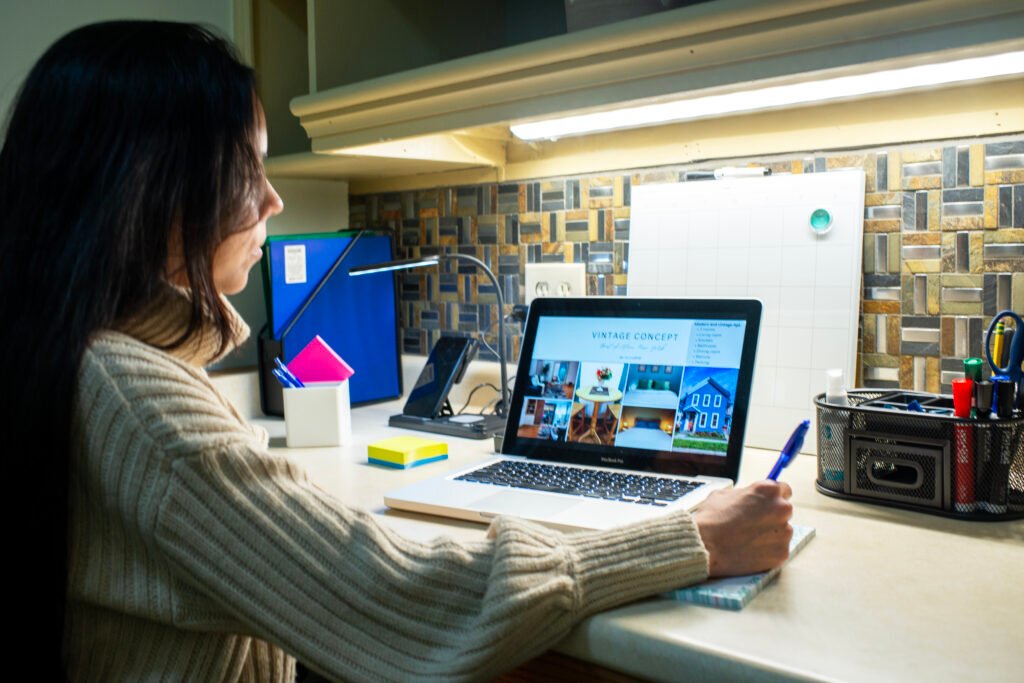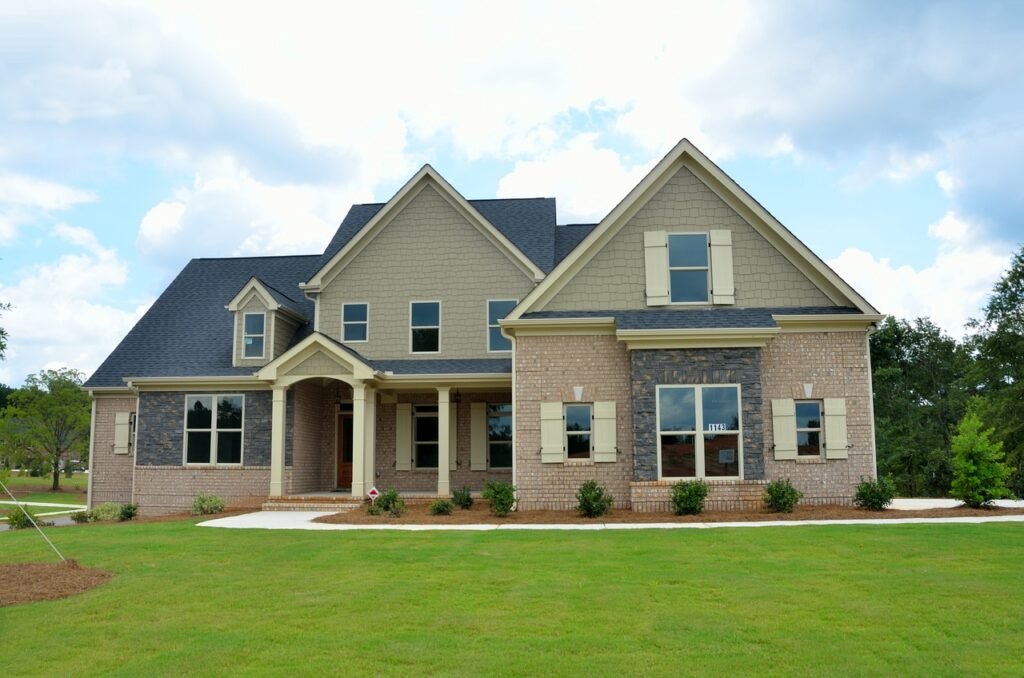In an industry where hospitality and safety are paramount, a staggering 81% of hotel guests rank security as their top priority when booking accommodations. This statistic underscores the critical importance of implementing robust security measures to protect both your guests and your property. As a hospitality professional, ensuring the well-being of your visitors while safeguarding your assets is an essential aspect of running a successful business.
Key Takeaways
- Maintaining a secure environment is crucial for guest satisfaction and loyalty in the hospitality industry.
- Comprehensive security measures not only protect your property but also help fulfill legal obligations and enhance your brand’s reputation.
- Proactive risk assessment and the implementation of advanced security technologies are essential to mitigating a wide range of threats, from theft to natural disasters.
- Effective security protocols, staff training, and emergency response planning are vital for ensuring the safety and well-being of your guests.
- Balancing security with guest comfort and creating a welcoming atmosphere is a delicate but necessary balance for hospitality businesses.
Understanding the Importance of Security in the Hospitality Industry
In the hospitality industry, guest safety and security are paramount. From the moment a traveler steps into a hotel or vacation rental, they expect a secure and comfortable environment that caters to their needs. Effective risk mitigation strategies and robust security protocols not only protect guests but also enhance the overall guest safety and experience.
The Impact of Safety on Guest Experience
Guests are more likely to feel at ease and enjoy their stay when they know their personal safety and the security of their belongings are prioritized. Proactive measures, such as secure access control, surveillance, and emergency preparedness, can significantly contribute to a positive and memorable guest experience. Conversely, security breaches or incidents can severely impact a guest’s perception and willingness to return or recommend the property.
Legal Obligations for Property Owners
Beyond the moral responsibility to ensure guest safety, property owners have legal obligations to maintain a secure environment. Compliance with local regulations, fire safety codes, and data privacy laws is crucial for avoiding costly fines and legal disputes. By prioritizing security, property owners can protect themselves and their guests, demonstrating their commitment to a safe and responsible hospitality experience.
Reputation Management and Security
In today’s digital age, a property’s reputation can make or break its success. Guests are more likely to trust and choose accommodations that have a proven track record of providing a safe and secure environment. Effective security protocols not only safeguard guests but also contribute to the overall reputation and credibility of the property, ultimately leading to increased occupancy and revenue.
“Prioritizing security is not just a legal requirement, but a strategic investment in the long-term success and reputation of a hospitality business.”
Key Security Risks for Hotels and Rentals
In the hospitality industry, property owners and managers must be vigilant in addressing a range of security risks to protect their guests, staff, and assets. From theft and burglary threats to cybersecurity concerns and natural disasters, a comprehensive risk assessment and emergency preparedness plan are essential for property protection and risk mitigation.
Theft and Burglary Threats
One of the primary security concerns for hotels and rental properties is the threat of theft and burglary. Valuables left in guest rooms, unsecured entry points, and inadequate surveillance can make these establishments easy targets for criminal activity. Implementing robust access control systems, strategically placed security cameras, and staff training on theft prevention can significantly reduce the risks.
Cybersecurity Concerns
In the digital age, hotels and rental properties must also contend with the growing threat of cybersecurity breaches. Sensitive guest information, financial data, and internal systems can all be vulnerable to cyber attacks. Investing in emergency preparedness measures, such as secure data storage, regular software updates, and employee cybersecurity training, can help mitigate these risks.
Natural Disasters and Emergency Preparedness
Natural disasters, such as storms, floods, and earthquakes, can pose a significant threat to hospitality properties and the safety of their guests. Developing a comprehensive emergency preparedness plan, which includes evacuation procedures, emergency communication strategies, and backup systems, is crucial for ensuring the well-being of everyone on the premises and minimizing the impact on the property.
By proactively addressing these key security risks, hospitality businesses can enhance property protection, safeguard their guests, and maintain their reputation as safe and secure destinations. A thoughtful approach to security can ultimately contribute to a positive guest experience and the long-term success of the business.
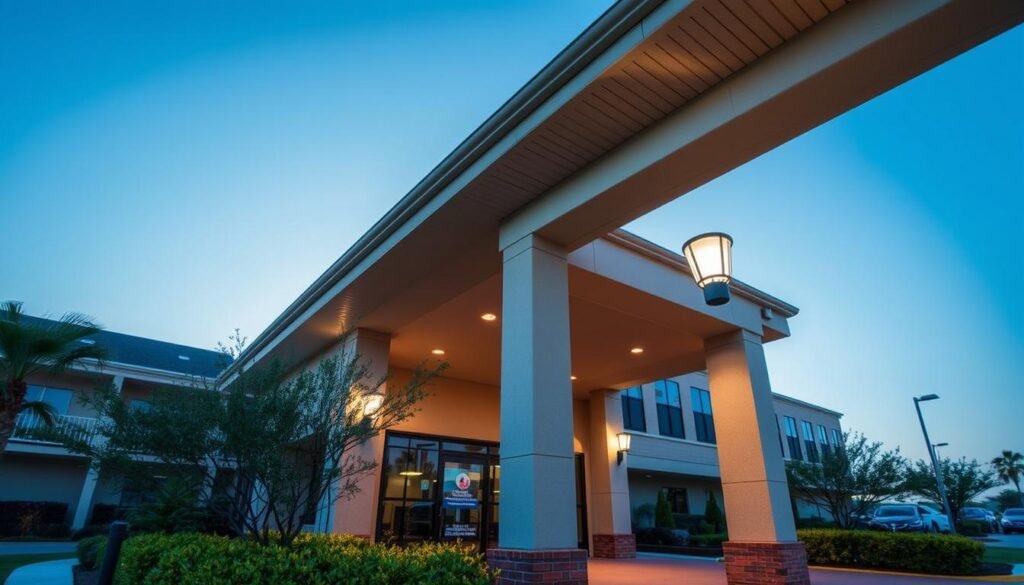
Implementing Effective Access Control Systems
In the hospitality industry, maintaining robust access control is paramount to safeguarding both guests and property. From keycard access solutions to sophisticated surveillance systems, modern technology offers a range of tools to enhance property protection and ensure a secure environment for all.
Keycard Access Solutions
Keycard access systems have become a standard in the hospitality industry, providing a convenient and secure way for guests to enter their rooms. These systems not only restrict unauthorized access but also enable hosts to monitor and manage guest entry, fostering a sense of safety and control.
Surveillance Cameras and Monitoring
Strategically placed surveillance cameras can significantly improve security by deterring criminal activity and providing valuable footage in the event of an incident. Complemented by robust monitoring systems, these solutions allow hosts to keep a watchful eye on common areas and high-traffic zones, ensuring the well-being of their guests and the protection of their property.
Visitor Management Systems
Effective visitor management is a crucial component of comprehensive security. By implementing visitor check-in procedures, hosts can verify guest identities, maintain a record of visitors, and control access to the property, further enhancing the overall security of the premises.
| Feature | Benefit |
|---|---|
| Keycard Access | Restricted entry and guest monitoring |
| Surveillance Cameras | Deterrence and incident monitoring |
| Visitor Management | Controlled access and visitor records |
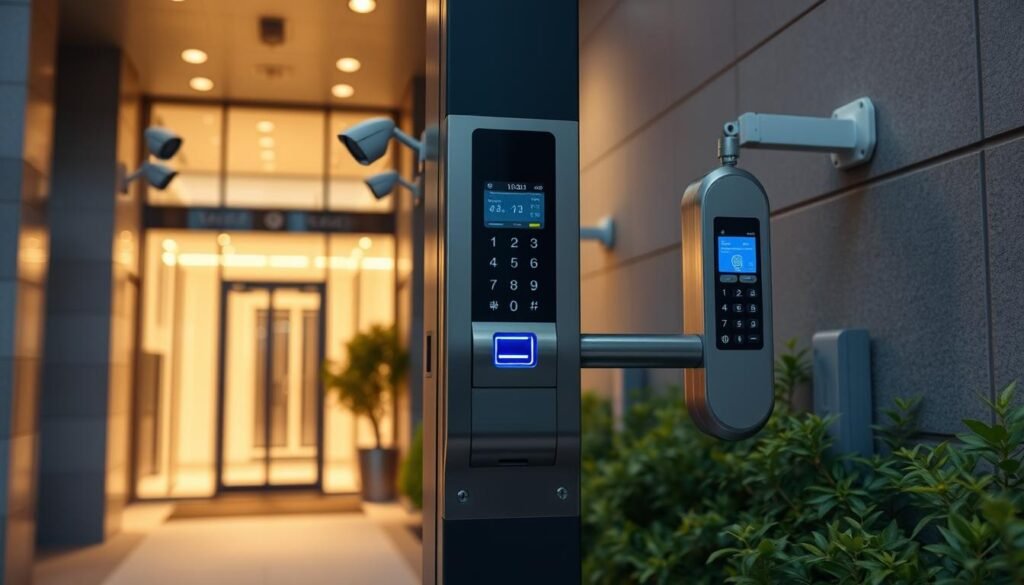
By implementing a comprehensive access control strategy, hosts can strike a balance between guest comfort and property security, ensuring a safe and enjoyable experience for all.
Training Staff on Security Protocols
In the rapidly evolving hospitality industry, staff training on security protocols plays a crucial role in maintaining the safety and well-being of both guests and property. By fostering a culture of security awareness, Airbnb hosts and hotel managers can ensure their establishments remain secure and compliant with local regulations.
Importance of Employee Awareness
Employees are the first line of defense against potential security threats. Comprehensive staff training programs that cover security protocols, emergency procedures, and guest safety issues empower staff to respond effectively to various scenarios. Equipping your team with the knowledge and skills to handle security challenges can significantly enhance the overall guest experience and protect your property.
Conducting Regular Security Drills
Maintaining a high level of preparedness is crucial. Regular security drills help your staff stay sharp and ensure they can execute security protocols seamlessly during emergencies. These drills should cover a range of scenarios, from natural disasters to criminal activities, and provide staff with the opportunity to practice their response tactics.
Handling Emergencies and Guest Safety Issues
Effective training also encompasses procedures for responding to emergencies and addressing guest safety concerns. Staff should be equipped with the knowledge and resources to swiftly handle incidents, communicate with guests, and coordinate with local authorities when necessary. By instilling confidence and a sense of responsibility, your team can contribute to a secure and reassuring environment for all.
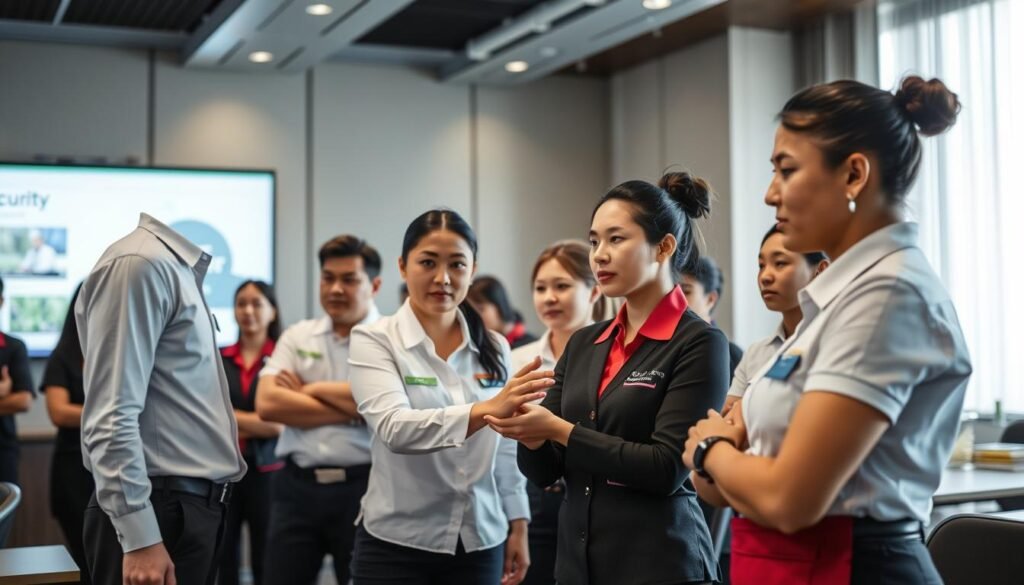
“Investing in comprehensive security training for your staff is not just a practical necessity but a strategic advantage in the highly competitive hospitality landscape.”
Utilizing Technology to Enhance Security
In the ever-evolving landscape of hospitality, technology has emerged as a powerful ally in enhancing security measures for hotels and vacation rentals. From smart door locks and home automation systems to mobile security apps and real-time data monitoring, there is a wealth of innovative solutions that can help property owners and managers mitigate risks, improve access control, and provide a safer environment for their guests.
Smart Door Locks and Home Automation
Smart door locks offer a convenient and secure alternative to traditional keys, allowing hosts to remotely grant and revoke access, track entry and exit times, and even receive notifications of potential unauthorized access. Integrating these locks with broader home automation systems can further enhance security, enabling hosts to monitor activity, control lighting, and respond to potential threats in real-time.
Mobile Apps for Security Management
Cutting-edge mobile applications designed for the hospitality industry are transforming the way hosts manage security. These apps often provide a centralized platform for monitoring surveillance systems, controlling access, and receiving instant alerts on their smartphones or tablets. This level of remote access and visibility empowers hosts to stay informed and responsive, even when they’re away from their property.
Real-Time Data Monitoring
The proliferation of surveillance systems and access control technologies has led to an abundance of security-related data that can be leveraged to identify patterns, detect anomalies, and proactively address risk mitigation concerns. By integrating these systems with advanced data analytics and reporting tools, hosts can gain valuable insights to enhance their overall security strategy and decision-making processes.
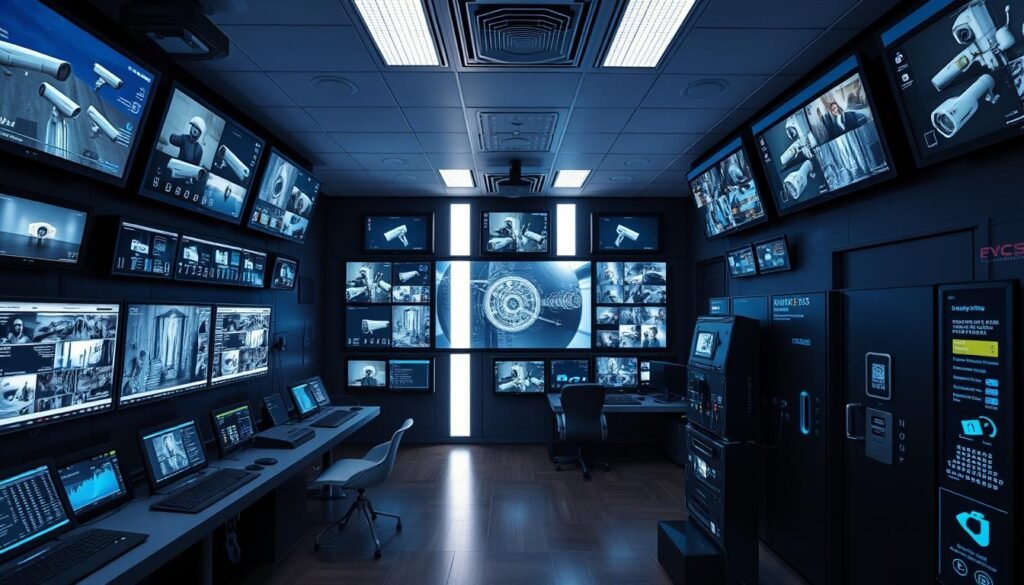
“Embracing the latest security technologies not only helps protect our guests and property, but also gives us the peace of mind to focus on delivering an exceptional hospitality experience.”
As the hospitality industry continues to evolve, the strategic deployment of cutting-edge security technologies will be essential for property owners and managers seeking to maintain a competitive edge, safeguard their assets, and provide a secure and welcoming environment for their guests.
Developing an Emergency Response Plan
In the dynamic hospitality industry, where guest safety is paramount, having a comprehensive emergency response plan is essential. This plan serves as a roadmap to guide hotel and rental property owners through unexpected crises, ensuring a swift and coordinated response that minimizes the impact on guests, staff, and the property itself.
Creating Clear Procedures
The foundation of an effective emergency response plan lies in establishing clear and detailed procedures. These should outline the specific steps to be taken in various emergency scenarios, such as natural disasters, active shooter situations, or medical emergencies. By outlining these procedures, property owners can ensure a consistent and efficient response, reducing the confusion and chaos that often accompanies such events.
Communication Strategies During Emergencies
Effective communication is crucial during emergencies. The emergency response plan should include strategies for communicating with guests, staff, and local authorities. This may involve pre-written emergency messages, designated communication channels, and a clear chain of command to ensure information is disseminated accurately and promptly.
Regularly Reviewing and Updating the Plan
An emergency response plan is not a static document; it must be regularly reviewed and updated to address changing circumstances, new threats, and evolving best practices in emergency preparedness and incident response. Property owners should schedule periodic reviews and incorporate feedback from staff, guests, and local authorities to ensure the plan remains relevant and effective in safeguarding guest safety.

By developing a comprehensive emergency response plan, hospitality providers can demonstrate their commitment to their guests’ well-being and their ability to handle unexpected situations with professionalism and care. This proactive approach not only enhances the overall guest experience but also reinforces the property’s reputation as a safe and secure environment.
Ensuring Guest Safety in Common Areas
In the hospitality industry, maintaining the safety and security of guests in common areas is of utmost importance. Thoughtful design, regular maintenance, and effective emergency lighting and signage are crucial elements in creating a secure environment that prioritizes guest safety, property protection, and overall risk mitigation.
Designing Safe and Accessible Spaces
When designing common areas, it’s essential to prioritize accessibility and safety. This includes ensuring smooth pathways, adequate lighting, and the strategic placement of furniture and decor to minimize tripping hazards. By incorporating universal design principles, you can create spaces that are welcoming and secure for guests of all abilities.
Regular Maintenance and Upkeep
- Regularly inspect common areas for potential safety issues, such as loose tiles, uneven surfaces, or damaged furniture.
- Promptly address any maintenance concerns to maintain a well-kept and safe environment.
- Implement a proactive cleaning schedule to keep common areas free of debris and hazards.
Emergency Lighting and Signage
Effective emergency lighting and clear signage are crucial for ensuring guest safety in the event of a crisis. Install high-quality emergency lighting that automatically activates during power outages, and strategically place visible exit signs and safety instructions throughout the property. By being prepared for emergencies, you can help mitigate risks and provide a secure experience for your guests.
By focusing on these key areas, you can create a guest experience that prioritizes safety and security, ultimately strengthening your property’s reputation and building trust with your guests.

Protecting Guest Information and Privacy
In the hospitality industry, safeguarding guest information and privacy is of paramount importance. As hotels and vacation rentals handle sensitive data, from personal details to payment information, maintaining robust security protocols is crucial to upholding guest safety and building trust.
Best Practices for Data Protection
Implementing comprehensive data protection measures is essential to mitigate the risk of data breaches and unauthorized access. This includes utilizing secure servers, encrypted communication channels, and regularly updating software and systems. Regular security audits and the implementation of robust access controls are also vital to ensuring the integrity of guest data.
Compliance with Privacy Regulations
Adhering to applicable privacy regulations, such as the General Data Protection Regulation (GDPR) and the Health Insurance Portability and Accountability Act (HIPAA), is a critical component of data protection. Hospitality businesses must ensure they have the necessary policies, procedures, and safeguards in place to comply with these regulations and protect guest information.
Training Staff on Data Security
Empowering staff with comprehensive training on data security protocols is crucial to maintaining guest safety and privacy. Employees must be educated on best practices for handling sensitive information, recognizing and reporting potential security threats, and responding to data breaches or other security incidents. Regular refresher courses and ongoing support ensure that staff remain vigilant and proactive in safeguarding guest data.
By prioritizing data protection, compliance, and staff training, hospitality businesses can foster a culture of security and privacy that instills confidence in their guests and safeguards their most valuable information.

Networking with Local Law Enforcement
In the hospitality industry, establishing strong relationships with local law enforcement is a crucial aspect of comprehensive security protocols and risk mitigation efforts. By fostering partnerships with the police department, hoteliers and vacation rental owners can enhance the property protection measures in place, ensuring the safety and security of their guests and assets.
Building Relationships with Police Departments
Proactive outreach to local law enforcement agencies can open the door to valuable collaboration. Regular meetings with police officials can help you understand the specific crime trends and security risks in your area, allowing you to tailor your security strategies accordingly. Inviting officers to conduct site visits and providing them with detailed information about your property can further strengthen these relationships.
Community Safety Programs
- Participating in community-based safety initiatives, such as neighborhood watch programs, can foster a sense of collective responsibility for crime prevention.
- Collaborating with the police on educational campaigns can help your guests and staff become more aware of potential security threats and the actions they can take to mitigate them.
- Supporting local law enforcement events and activities can demonstrate your commitment to the safety and well-being of the entire community.
Crime Prevention Tips from Authorities
Regularly seeking guidance from law enforcement experts can provide valuable insights into the latest security protocols and best practices for risk mitigation. Implementing their crime prevention recommendations, such as improving lighting, enhancing surveillance, and implementing access control systems, can significantly enhance the overall property protection of your hospitality establishment.
| Crime Prevention Tip | Potential Impact |
|---|---|
| Improve Lighting | Deters criminal activity and enhances visibility for guests and staff |
| Enhance Surveillance | Helps monitor and record potential security incidents |
| Implement Access Control | Restricts unauthorized entry and improves overall property protection |

By actively engaging with local law enforcement and implementing their crime prevention recommendations, hospitality businesses can create a safer and more secure environment for their guests, staff, and property.
Balancing Security with Guest Comfort
Maintaining a secure environment for your guests is crucial, but it shouldn’t come at the expense of their overall experience. Striking the right balance between effective guest safety measures and creating a welcoming atmosphere is the key to success in the hospitality industry.
Creating a Welcoming Atmosphere
A warm, inviting atmosphere can go a long way in making your guests feel comfortable and at home. Incorporate design elements that promote a sense of openness and security, such as well-lit common areas, clear signage, and discreet surveillance cameras. Train your staff to be friendly, attentive, and responsive to guest needs, fostering a culture of keeping your guests and property safe.
Incorporating Discreet Security Measures
- Utilize smart home technologies, like keyless entry systems and automated lighting, to enhance security without compromising the aesthetics of your property.
- Strategically place security cameras in high-traffic areas, ensuring they blend seamlessly with the overall décor.
- Provide discreet security personnel, such as plainclothes officers or security concierges, to maintain a subtle presence and respond to any incidents.
Guest Education on Security Features
Inform your guests about the safety features available at your property, as this can help them feel more secure and at ease. Provide clear instructions on how to use the various security systems, such as keycard access or emergency procedures. Encourage guests to report any suspicious activity or security concerns, fostering a collaborative approach to guest safety.
“Balancing security and guest comfort is a delicate dance, but with the right strategies, it’s a challenge we can overcome.”
By carefully considering the needs of your guests and implementing a comprehensive security plan, you can create an environment that is both safe and welcoming, ultimately enhancing the overall experience for all who visit your property.

Responding to Security Incidents
In the fast-paced hospitality industry, the ability to respond swiftly and effectively to security incidents is paramount. By having a well-defined incident response plan in place, hotel and rental property owners can mitigate the impact of potential threats and ensure the safety of their guests and staff.
Immediate Actions to Take
When a security incident occurs, the first step is to take immediate action. This may include activating emergency protocols, contacting local law enforcement, and securing the affected area. Proper staff training is crucial, as employees must be prepared to respond calmly and follow established security protocols. Regular staff training drills can help ensure everyone is aware of their roles and responsibilities during an incident.
Reporting and Documenting Incidents
Thorough documentation is essential for effective incident response. Detailed reports should be created, outlining the nature of the incident, the actions taken, and any relevant evidence or witness statements. This information can be used to support investigations, inform future security measures, and protect the property and its guests in the event of legal proceedings.
Learning and Improving from Experience
After an incident has been resolved, it’s important to review the response and identify areas for improvement. By analyzing the effectiveness of the security protocols and the staff’s performance, hospitality professionals can enhance their preparedness for future incidents. This continuous learning and improvement process is crucial for maintaining a high level of security and guest safety.
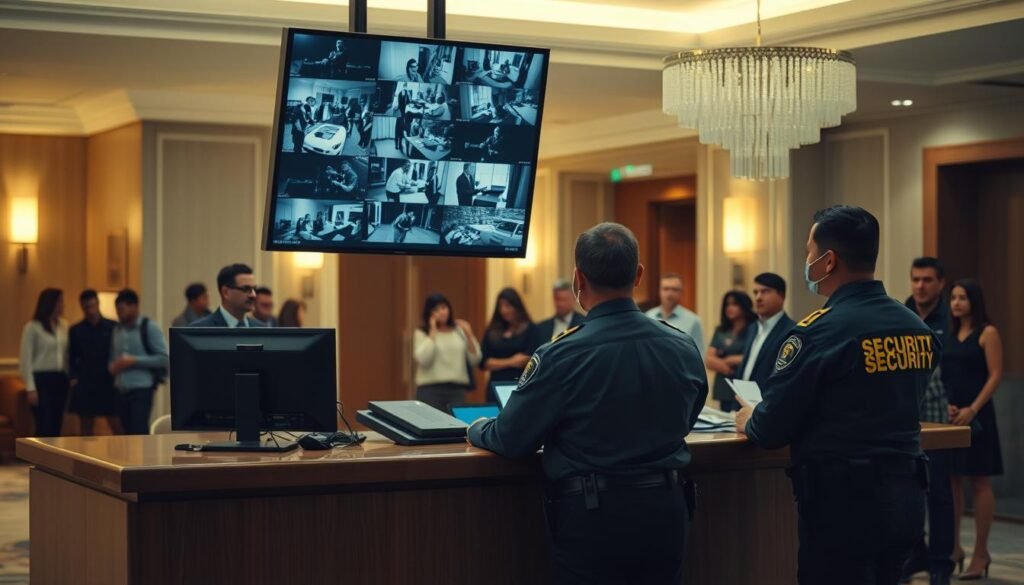
“Effective incident response is the cornerstone of a robust security strategy in the hospitality industry. By prioritizing preparedness and continuous improvement, hotel and rental property owners can safeguard their guests and their business.”
Regularly Assessing and Upgrading Security Measures
Maintaining effective security protocols is a continuous process, not a one-time task. As an Airbnb host, it’s crucial to regularly assess your security measures and stay up-to-date with the latest industry trends and technological advancements. This approach helps you mitigate risks, enhance guest safety, and protect your property.
Conducting Security Audits
Periodic security audits are essential for identifying potential vulnerabilities and evaluating the effectiveness of your current security systems. Consider enlisting the expertise of a security professional to conduct a comprehensive assessment of your property, including the evaluation of access control, surveillance systems, and emergency preparedness. This comprehensive review can provide valuable insights to help you strengthen your security protocols.
Keeping Up with Industry Trends
The hospitality industry is constantly evolving, and new security technologies and best practices are continually emerging. As an Airbnb host, it’s crucial to stay informed about the latest trends and innovations. This may involve subscribing to industry publications, attending relevant conferences, or joining online communities to learn from the experiences of other hosts. By staying ahead of the curve, you can proactively address security concerns and provide your guests with the safest possible environment.
Investing in New Technologies
Advances in technology have revolutionized the security landscape, offering Airbnb hosts a wide range of solutions to enhance risk mitigation and guest safety. From smart locks and automated surveillance systems to mobile apps for security management, investing in new technologies can significantly improve your property’s overall security protocols. Regularly evaluating and upgrading your security systems demonstrates your commitment to guest safety and can contribute to a positive hosting experience.
By regularly assessing and upgrading your security, you can ensure that your Airbnb property remains a safe and secure haven for both you and your guests. This proactive approach not only protects your investment but also helps to maintain a positive reputation within the Airbnb community.

| Security Measure | Benefits | Potential Investments |
|---|---|---|
| Access Control | Restrict unauthorized entry, monitor guest movements | Keycard systems, smart locks, biometric technologies |
| Surveillance Systems | Enhance property monitoring, deter criminal activity | High-definition CCTV cameras, motion sensors, cloud-based storage |
| Emergency Preparedness | Ensure guest safety during critical incidents | Smoke detectors, fire extinguishers, emergency exit planning |
“Investing in security measures is not just about protecting your property, but also about providing your guests with a safe and worry-free experience.”
By implementing a comprehensive security strategy that includes regular assessments, industry awareness, and targeted investments, you can create a secure environment that benefits both you and your Airbnb guests.
Conclusion: Prioritizing Security for Success
As we’ve explored the comprehensive landscape of security essentials in the hospitality industry, it’s evident that prioritizing security is paramount for ensuring the long-term success and sustainability of your property. By implementing robust security measures, hoteliers and vacation rental owners can unlock a multitude of benefits that extend far beyond the confines of guest safety and property protection.
The Long-Term Benefits of Enhanced Security
Investing in security optimization not only safeguards your guests and your assets but also strengthens your brand reputation, improves operational efficiency, and ultimately drives increased bookings and revenue. A well-secured property instills a sense of trust and confidence in your guests, fostering loyalty and positive word-of-mouth that can propel your business to new heights.
Fostering a Safe Environment for All
Elevating the security measures in your hotel or vacation rental goes beyond protecting physical assets – it creates a safe haven for your guests and employees alike. By proactively addressing security risks and empowering your staff to respond effectively, you cultivate an environment where everyone can feel secure, comfortable, and empowered to enjoy their experience to the fullest.
Final Thoughts on Security Essentials
As the hospitality landscape continues to evolve, the importance of security will only become more pronounced. By embracing the security essentials outlined in this article, you’ll position your property for long-term success, safeguard your guests and assets, and set the stage for an unparalleled hospitality experience that will keep your customers coming back time and time again.
FAQ
What are the key security risks for hotels and vacation rentals?
The main security risks include theft and burglary threats, cybersecurity concerns, and natural disasters. Property owners need to implement comprehensive risk assessment and emergency preparedness plans to protect guests and their property.
How can effective access control systems enhance security?
Keycard access solutions, surveillance cameras, and visitor management systems are essential for controlling access and monitoring activity on the property. These systems help improve overall security while maintaining a welcoming atmosphere for guests.
Why is staff training crucial for security protocols?
Educating employees on security awareness, conducting regular security drills, and establishing clear protocols for handling emergencies and guest safety issues are critical for ensuring the effectiveness of security measures.
How can technology be utilized to enhance security in the hospitality industry?
Innovative technologies such as smart door locks, home automation systems, mobile security apps, and real-time data monitoring can significantly improve access control, risk mitigation, and overall security management.
What are the key components of an effective emergency response plan?
An emergency response plan should include clear procedures, communication strategies for emergencies, and a process for regularly reviewing and updating the plan to ensure it remains effective.
How can property owners balance security with guest comfort?
By creating a welcoming atmosphere, incorporating discreet security measures, and educising guests on available security features, property owners can maintain robust security while prioritizing guest experience and satisfaction.
What are the best practices for responding to security incidents?
Immediate actions, proper reporting and documentation, and a commitment to learning from past incidents to improve future security measures are crucial for effectively responding to security incidents.
Why is it important to regularly assess and upgrade security measures?
Conducting security audits, staying informed about industry trends, and investing in new technologies are essential for maintaining effective security protocols and adapting to evolving threats and guest expectations.


